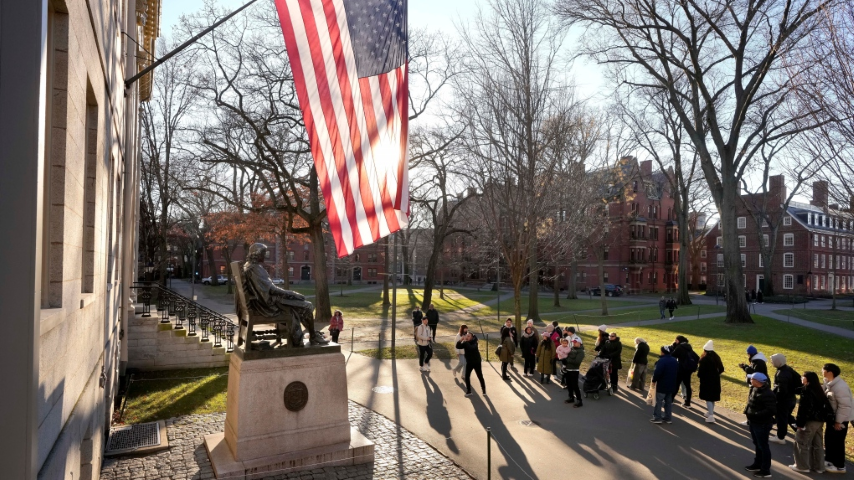
Individuals capture moments near a statue of John Harvard on the Harvard University campus in Cambridge, Mass., on Tuesday, January 2, 2024. The following Wednesday, January 10, a group of Jewish students initiated a legal action against Harvard University, alleging the institution had turned into a hub for widespread anti-Jewish animosity and mistreatment. (Photo credit: AP Photo/Steven Senne, File)
In a recent development, Harvard University is under legal scrutiny as several Jewish students file a lawsuit, claiming the institution has become a breeding ground for widespread anti-Jewish hostility and harassment. The legal action, which echoes similar lawsuits against other institutions since the October 7 Hamas attack on Israel, includes accusations of civil rights violations against Jewish students. The plaintiffs, who are members of Students Against Antisemitism, Inc., contend that Harvard tolerated the harassment, assault, and intimidation of Jewish students, particularly escalating after the mentioned attack.
According to the lawsuit, groups of pro-Hamas students and faculty have reportedly marched through the Harvard campus, vocalizing antisemitic slogans and advocating for harm to Jews and Israel. The lawsuit further alleges that these groups have occupied various university spaces, including buildings, classrooms, libraries, student lounges, plazas, and study halls, for extended periods, promoting violence against Jewish individuals.
While the reference to "mobs" in the lawsuit is not explicitly defined, Harvard has witnessed protests and disruptions since the October 7 incident. At one point, pro-Palestinian students occupied a campus building for a full 24 hours.
The legal action is being spearheaded by the law firm Kasowitz Benson Torres, with partner Marc Kasowitz emphasizing the necessity of the lawsuit due to what is described as Harvard's unwillingness to address its alleged deep-seated antisemitism voluntarily. Kasowitz contends that Harvard must be compelled to protect its Jewish students and eliminate any double standard regarding anti-Jewish bigotry.
In response, Harvard University has chosen not to comment on the ongoing litigation. However, it's worth noting that around a dozen students may be facing disciplinary charges for violating protest rules related to pro-Palestinian activities.
The broader context of the Israel-Hamas conflict has had a ripple effect on U.S. campuses, reigniting debates on free speech. College administrators grapple with defining the boundaries where political speech transforms into harassment and discrimination. Jewish and Arab students have expressed concerns that their respective institutions are not doing enough to ensure their safety.
This issue gained prominence in December when the presidents of Harvard, the University of Pennsylvania (Penn), and the Massachusetts Institute of Technology (MIT) testified before Congress on campus antisemitism. The presidents' responses, characterized as cautious and evasive, triggered backlash from donors and alumni, resulting in resignations at Penn and Harvard.
The aftermath of the October 7 Hamas attacks continues to impact campuses, prompting investigations by the U.S. Department of Education. Education Secretary Miguel Cardona revealed that the department has initiated over 40 investigations at colleges and universities in response to complaints of antisemitism and Islamophobia since the attacks.
Harvard University, in response to the growing concerns, issued a memo in November outlining plans to address antisemitism on campus. The university is undertaking an examination of how antisemitism manifests within its community, implementing educational programs for students and faculty, and emphasizing avenues to report incidents of fear or harm.















